
Dental Implants – Chelsea, MI
Make Your Tooth Replacement
More Convenient
If you’re feeling self-conscious about missing teeth, you may find it difficult to maintain a confident smile. In fact, having a confident smile can make a huge difference in your self-esteem, social life, and career. When compared to other forms of tooth replacement, dental implants are really the closest thing to having your natural teeth and being able to enjoy the foods you love as well as speak clearly to friends and family. Looking for a specialist who can complete the entire process in one dental office? Call Healthy Smiles Dental Care of Chelsea today for dental implants in Chelsea, MI!
Why Choose Healthy Smiles Dental Care for Dental Implants?

- Receive Care from Implant Specialists
- All-On-4 Dental Implants Available
- Complete Treatment in One Convenient Location
What is a Dental Implant?

Dental implants are small posts used to support dental restorations. They essentially act as prosthetic roots for teeth. Most implant posts are made from medical-grade titanium, which can be safely placed into the jawbone and hidden underneath gum tissue. In order for the implant to fully integrate with the jaw, several months of healing is needed. However, once it has fully healed, you can expect firm and confident support for a variety of restorations, including crowns, bridges, and even dentures.
The 4 Step Dental Implant Process
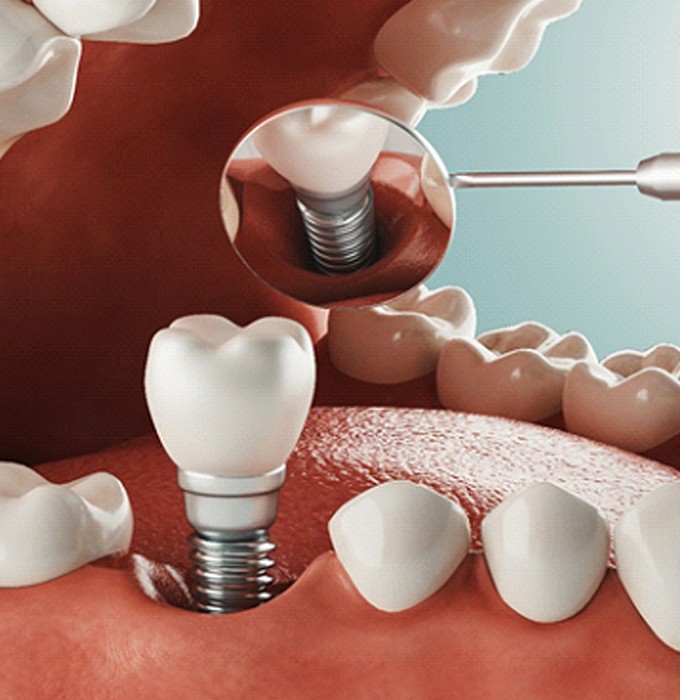
Restoring the entire structure of a missing tooth requires a slightly more involved process than simply being fit for a denture or dental bridge. To help make your tooth replacement more convenient, we are pleased to offer start-to-finish dental implant treatment right here in our office. Our Chelsea implant dentist Dr. Steven Rodriguez and in-house periodontist Dr. Hana Gadalla have the advanced training and experienced needed to perform each step of your dental implant treatment personally. While every patient’s journey towards a new smile will be somewhat unique, there are four main steps you can expect to take: the initial consultation, the implant placement surgery, osseointegration, and the delivery of your new restorations. Read on as we go over what you can expect when getting dental implants in Chelsea.
Initial Dental Implant Consultation

First, you’ll visit us for a dental implant consultation. During this appointment, we’ll be happy to discuss all the details about dental implants with you and answer any questions you may have about them. Then we’ll review your medical history, tooth replacement goals, and oral health to see if dental implants are a good choice for you. Some patients may need to undergo preliminary treatments like bone grafting or gum disease treatment beforehand to become good candidates for dental implants. Once you’re given the green light to move ahead with dental implants, we’ll work with you to create a custom treatment plan for your new smile.
Dental Implant Surgery
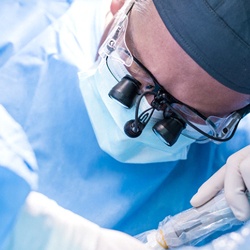
Next will be your dental implant placement surgery. Since we perform this step right here in our office, you won’t have to spend any extra time or money visiting an unfamiliar specialist on the other side of town! Instead, you’ll continue to work with a dental team you already know and trust.
To ensure your comfort during dental implant placement surgery, we will likely recommend nitrous oxide sedation or oral conscious sedation in addition to numbing your mouth. Once you’re comfortable, we’ll make a small incision in your gums to access your jawbone and position your dental implant or implants inside of it. Then, the gums are closed around the post and you’ll be sent home to heal.
Dental Implant Osseointegration & Abutment Placement
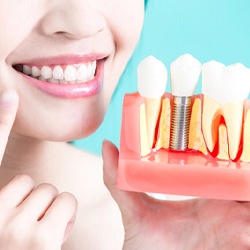
After your dental implant placement surgery, you will begin the healing process. While you should recover from the surgery itself relatively quickly, your jaw will need significantly more time to heal. Over the next three to six months, the titanium dental implant post(s) will integrate with the bone tissue in the jawbone to create a strong, reliable, and natural foundation. This process is called osseointegration. Once it has been completed, you’ll come back to our office to have a small connector piece called an abutment attached to the top of your dental implant. While you take the next several weeks to heal from this minor procedure, your new replacement teeth will be crafted.
Delivery of Dental Implant Restorations
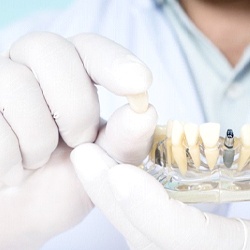
Finally, you’ll return to our office for the final step of your dental implant treatment. During this appointment, we’ll secure your custom-made crown, bridge, or denture onto your implants via the abutment pieces. Then, we’ll check to ensure your bite feels comfortable, that you’re pleased with the results, and that any other questions you may have are answered. Afterwards, you’ll be all set to walk out of our office and start enjoying your complete and confident smile!
Benefits of Dental Implants

When you’re considering different tooth replacement options, you’ll probably hear a lot of support for dental implants online and from dental experts. While no treatment is perfectly suitable for every patient, dental implants are generally considered to set the modern standard for replacing teeth thanks to the many revolutionary benefits that come with having new tooth roots inserted into your jaw. Below are some of the advantages you’ll see if you choose dental implants to regain your complete, confident smile.
Day-to-Day Benefits
Many people who wear dentures believe that their prosthetic teeth are holding them back from fully enjoying their lives. Dental implants, on the other hand, can make every day mor enjoyable thanks to these benefits:
- No Diet Restrictions: Replacing the entire structure of a missing tooth means your new smile will be almost as strong and stable as your natural one. As such, you can eat most foods without any sort of problem, including hard and sticky foods that can give denture wearers trouble.
- Clear Speech: It’s hard to speak clearly when your teeth are prone to moving around. Dental implants keep your dental prosthetics right where they should be so that they don’t interrupt you while you’re talking.
- Confident Smile: The implant posts are hidden under the gums and the restorations they support are made to match the rest of your natural facial aesthetics. In other words, your implant teeth will look almost identical to your natural teeth, so you’ll have no trouble showing them off when the situation calls for it.
- Easy Oral Hygiene: Are you worried about learning a new oral hygiene routine once you get new teeth? With dental implants, you don’t have anything to worry about; you’ll continue brushing and flossing the same way you always have.
Health Benefits
Your dental implants won’t just make your daily life better; they’ll also help you maintain your oral health with these benefits:
- Jawbone Preservation: Dental implants support the jawbone from within and provide stimulation to stop the bone resorption process that can occur after tooth loss. Your jawbone will maintain its strength and overall shape over the long term.
- Protect the Natural Teeth: Missing teeth leads to dental drift – the shifting of your remaining teeth. Dental implants can serve as a placeholder so that other teeth stay right where they should be.
- Improved Oral Health: Because it’s easier to clean dental implants, there’s a decreased risk for oral diseases linked to oral hygiene.
Long-Term Benefits
Dental implants don’t just make your life better today; they offer several benefits that you’ll be able to fully appreciate as time passes.
- High Success Rate: Dental implants have a notably high rate of success even after they’ve been in your mouth for over a decade.
- Longevity: The estimated lifespan for dental implants is usually 30 years or more. Some people are even able to keep them for their entire lives.
- Long-Term Savings: Other tooth replacements that have a lower price need to be replaced every few years. Dental implants can save you money by minimizing how often you need to get new teeth.
Who Dental Implants Can Help

If you’re looking to replace your missing teeth and you’re in generally good health, you’re very likely to be eligible for dental implants. As long as your mouth is healthy and your jawbone is strong (or if you’re willing to undergo preparatory treatments to meet these qualifications), then we can potentially use implants to bring back any number of your missing teeth. Here are the basics of who makes a good dental implant candidate and what to expect with your treatment.
Who Is a Good Candidate for Dental Implants?

While dental implants are more versatile than any other tooth replacement, you’ll still need to meet a few key criteria in order to make your treatment as smooth, safe, and successful as possible. Namely, good candidates for dental implants should have:
- Healthy gums – An infection in your gum tissue could compromise your implant posts, so we may need to perform gum disease therapy before placing your implants.
- Good overall health – Dental implant placement involves a minor oral surgery. Ideally, you should be free from any medical conditions that inhibit healing.
- Strong jawbone – Your implants can’t succeed if they don’t have enough healthy jawbone tissue to merge with. If you’ve lost jawbone density after losing your teeth, then we might be able to restore it back to full health with a bone graft.
After our dentists have given you the green light to move forward with the dental implant process, they can rebuild your smile using a version of one of these treatment plans.
Missing One Tooth

When you just need a single tooth replaced, we can recreate it with a dental implant post and a crown on top. This solution is actually healthier and more conservative in the long run than a traditional dental bridge, which involves shaving down some of the enamel from your remaining teeth in order to stay in place. A dental implant, in contrast, is completely self-reliant and won’t compromise the rest of your smile.
Missing Multiple Teeth

Keep in mind that dental bridges do not have to be anchored to natural teeth. For example, if you have multiple consecutive missing teeth, it’s possible to create a bridge that’s supported by dental implants! The crowns on either end of the bridge sit atop a pair of implant posts. These implants hold the replacement teeth between them, all without needing to modify your natural teeth sitting adjacent to the gap. For several empty teeth along an arch, we can also place a small number of posts to hold a partial denture in place, which will have much greater security than its traditional counterpart.
Missing All Teeth
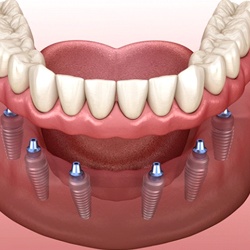
One of the major benefits of dental implants is that you don’t have to receive a dedicated implant for each tooth you’ve lost. In fact, in most cases we can create enough support for a full denture with just four to eight implants that are strategically positioned throughout your arch. We can design your implant denture to be either fixed or removable, but in either case, your new teeth will be just as reliable as the ones you were born with.
Cost of Dental Implants

When you choose dental implants to replace your missing teeth, you’re choosing a long-term solution that will improve your health, confidence, and overall quality of life for many years to come. It’s important to think about all the different factors that can affect the cost of implants as well as the benefits that make the treatment worthwhile. Below is a brief outline of the different parts of the implant process and how they affect the total that you pay.
Preliminary Treatments & Dental Implant Surgery
You can only get dental implants if your mouth is free of gum disease and if your jawbone has enough density to support the posts. For this reason, you might have to budget in gum disease therapy and bone grafts as part of the implant process. Also, if the tooth you’re replacing is still in your mouth, you’ll have to pay for the extraction as well.
Dental implant surgery will have its own cost. The exact amount you pay will vary depending on how many implant posts you need. The use of anesthesia during the surgery may increase costs. Bear in mind that since the surgery is handled by an outside specialist, the fee for the treatment is separate from the fee for restoration.
The Parts of Your Dental Implant
Dental implants consist of a post that is inserted into the jaw, an abutment, and a restoration. The materials used to make each of these components will impact the final cost. Most dental implants are made out of high-quality titanium that can easily fuse with the jawbone and last for decades with minimal maintenance. On the rare occasion that you have a titanium allergy, you might receive zirconia implants instead. The restorations we provide will normally be made out of lifelike, durable ceramic materials.
Final Dental Implant Restoration
The cost of your implant restoration will depend on the type you need:
- Patients who are only getting a single implant to replace one tooth will get a customized dental crown.
- A dental bridge will let you replace three or more teeth in a row with just two dental implants.
- Partial dentures can be anchored to a strategic number of implants to replace teeth in multiple areas of the mouth.
- Four to eight implants can support a full denture in order to replace an entire arch of teeth.
Does My Dental Insurance Cover Dental Implants?
Many major insurance plans do not pay for implants, considering them a cosmetic procedure. Some plans will offer some coverage, however, so it’s important to double-check your benefits. Our team can go over the details of your plan with you to figure out what your plan is willing to pay. Keep in mind that even if implant surgery isn’t covered, certain parts of the procedure like preliminary treatment might be partially paid for. Click here to learn more about insurance and how it’s used at our practice.
Making Dental Implants Affordable
You do have a variety of options to pay for dental implants even if you don’t have insurance. For example, you can sign up for our in-house dental savings plan. There are no premiums, deductibles, or annual maximums to stress over. Instead, you pay your yearly membership fee to enjoy discounts on implants and other services. We can also help you apply for dental financing so that you can break the cost of your care into smaller, more manageable chunks that you can pay on a monthly basis.
Dental Implants Post-Op Instructions

Dental implants are much like your natural teeth in that they are strong and durable on their own, but they still need to be protected from damage. This is especially true right after the surgery while your mouth is still healing and forming a bond with the posts. You’ll be given post-op instructions after your dental implant surgery, but you can start getting prepared right now by reviewing the basics of what you can normally expect below.
What to Do Directly After Dental Implant Surgery

You can generally expect to need at least one or two days of rest after dental implant surgery. During your recovery, you need to be particularly careful about protecting the blood clot on your surgery site. This clot protects the site from infection, and if it becomes dislodged it can be very painful. Spitting, drinking from straws, smoking, and touching the surgery site can all put your blood clot at risk, so be sure to refrain from them until your mouth has healed completely.
Common Side Effects

Gradual and intermittent bleeding, swelling, and general discomfort are all common side effects of implant surgery (and other types of oral surgery in general), so don’t be alarmed if they occur over the next few days. That said, these symptoms should slowly start to disappear over time; if they start to grow worse or persist past a certain point, something has gone wrong with the recovery process and you need to call our office immediately. In the meantime, though, we can give you tips for managing normal side effects. For example, swelling can be controlled by applying a cold compress to the area.
Diet

You should only eat soft foods after your surgery until any discomfort in your mouth has faded. Mashed potatoes, yogurt, scrambled eggs, yogurt, pasta, and ice cream are all good choices to stock up on before the day of your implant surgery. If you have soup, make sure that it’s not particularly hot, as the area around the implant may be sensitive. Even after you return to eating heartier foods, avoid chewing directly with the dental implant post until a restoration has been placed on it.
Health & Oral Hygiene

Needless to say, you still need to brush every day after getting dental implants. This includes the implant site, although you’ll need to be very careful about brushing around it. You should also rinse your mouth with salt water after every meal, or at least two to three times a day.
What to Do After Your New Teeth Are Attached

Your final restoration will be attached to your dental implants after your mouth has already healed. You may experience some minor discomfort at this point; you can use pain medication if you need to, but it shouldn’t be anything you can’t manage. There shouldn’t be any swelling or bleeding at this point in the process, so if you notice any unusual symptoms, contact our team right away.
Maintaining & Caring for Your Dental Implants

Dental implants are designed to last a lifetime. However, that’s only the case if you take proper care of your new smile. By following a few simple steps, you can keep your implants safe against damage and infection. At Healthy Smiles Dental Care in Chelsea, we want to teach you how to maintain a complete, strong, and healthy grin for years to come. To learn more, continue reading or give our office a call today!
Make Oral Hygiene a Priority
Even though dental implants can’t get cavities, that doesn’t mean you can slack off on your oral hygiene. A solid at-home dental care routine is essential for protection against issues like decay and gum disease. Brushing twice a day, flossing daily, and rinsing daily with an ADA-approved mouthwash are excellent practices that help prevent the accumulation of harmful bacteria. As a result, your risk of dental implant failure is much lower.
Eat a Healthy Diet
Once you’re all healed up, you can eat almost any food your heart desires! However, be sure to avoid consuming an excess amount of sugary, starchy, and acidic foods. They can increase your risk of oral health issues and be detrimental to your implants. Instead, it’s best to stick to a diet full of nutrient-rich foods! Eating fresh fruits, vegetables, whole grains, lean proteins, and dairy products is beneficial to your gums and enamel.
Break Bad Habits
Do you smoke, bite your fingernails, chew on pens or pencils, or use your teeth as tools? These poor habits may seem harmless, but they can destroy your smile. If you want to lower your risk of dental implant failure, do yourself a favor and kick these bad habits to the curb. It’s a good idea to keep some sugar-free gum in your pocket for times when you feel tempted to chew on your nails or another non-food item.
Protect Your Dental Implants
If you regularly play sports or grind your teeth at night, ask our team about a custom-made oral device. A mouthguard can prevent serious damage to your enamel or implants. Additionally, it can help you avoid chronic jaw pain that can contribute to temporomandibular joint disorder.
Schedule Regular Dental Checkups
Aside from good oral hygiene, you must visit your dentist every six months for a checkup and cleaning to ensure your implants stay in excellent condition. These preventive appointments allow our team to review your prosthetics and restorations. We’ll keep an eye out for any problems and address them before they turn into severe complications.
Dental Implant Failure & Salvage

Dental implants are successful in more than 95% of cases. Unfortunately, though, they do have the potential to fail, especially if an infection, injury, or another medical condition threatens their ability to function. If you believe that something is amiss with your dental implants, call us right away. We will evaluate the situation and recommend your next steps. Our goal is to address the situation as conservatively as possible and allow you to continue enjoying all the benefits of your restored smile.
Dental Implant FAQs

Are you wondering what your life will be like with dental implants in Chelsea? As one of the most highly recommended tooth replacement treatments, dental implants have a lot to offer, and we don’t want you to miss out on their benefits! That’s why we’ve included a list of some of the most commonly asked questions that we receive from our patients below. If you don’t see the answers you’re looking for, feel free to call our office to ask!
How long do dental implants last?
With the proper daily care and maintenance, dental implants have been proven to last up to 35 years (and sometimes longer!). The key is to stay on top of your normal oral hygiene routine at home and continue visiting your dentist in Chelsea every six months for checkups and cleanings to make sure your restorations and implants are healthy and functioning properly.
Can I take dental implants out?
Dental implants themselves are fused with your jawbone through a process called osseointegration, which gives them their lifelike look and feel. Because of this natural bond, you won’t be able to remove your implant posts, but if a complication occurs, an oral surgeon can remove them. Otherwise, you can attach removable prosthetics to your implants so you can easily take them out and clean them, just like you would be able to with traditional dentures.
How successful are dental implants?
Over the last few decades, the dental implant procedure has been nearly perfected and boasts an impressive 98 percent success rate. Your implants are the most vulnerable as they’re integrating with your jawbone, which is why it’s crucial to follow your dentist’s tips for success after your surgery.
How can I tell if my dental implant is failing?
There are several signs that your dental implants could be failing, including:
- Severe Pain- While you may experience some discomfort after your dental implant surgery, if you have excruciating, throbbing waves of pain that occurs long after your procedure, it could be a sign of implant failure.
- Gum Recession- Gum recession around the implant post can occur due to a poorly placed implant that may not have enough support around the post.
- Difficulty Chewing- If you ever experience discomfort while chewing, it could be a sign of implant failure.
- Shifting or Loose Implant- Your implant is fused with your jawbone, so it should never move or shift within your mouth.
- Swollen Gums- While minor swelling after your surgery is completely natural, if after some time you notice that your gums appear red and inflamed, it could be a sign of peri-implantitis, which is a common infection that results in implant failure.
As long as you keep up with your oral hygiene, you should be able to avoid implant failure. If you have conditions like bruxism, be sure to mention it during your initial consultation so we can take steps to improve your chances of a successful dental implant treatment.